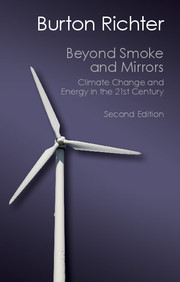Book contents
- Frontmatter
- Contents
- Preface to the Second Edition
- List of Units
- List of Conversion Factors
- List of Abbreviations
- 1 Introduction
- Part I Climate
- Part II Energy
- 6 Taking up Arms Against this Sea of Troubles
- 7 How Fast to Move: A Physicist’s Look at the Economists
- 8 Energy, Emissions, and Action
- 9 Fossil Fuels – How Much Is There?
- 10 Electricity, Emissions, and Pricing Carbon
- 11 Efficiency: the First Priority
- 12 Nuclear Energy
- 13 Renewables
- 14 Biofuels: Is There Anything There?
- 15 An Energy Summary
- Part III Policy
- References
- Index
9 - Fossil Fuels – How Much Is There?
Published online by Cambridge University Press: 05 November 2014
- Frontmatter
- Contents
- Preface to the Second Edition
- List of Units
- List of Conversion Factors
- List of Abbreviations
- 1 Introduction
- Part I Climate
- Part II Energy
- 6 Taking up Arms Against this Sea of Troubles
- 7 How Fast to Move: A Physicist’s Look at the Economists
- 8 Energy, Emissions, and Action
- 9 Fossil Fuels – How Much Is There?
- 10 Electricity, Emissions, and Pricing Carbon
- 11 Efficiency: the First Priority
- 12 Nuclear Energy
- 13 Renewables
- 14 Biofuels: Is There Anything There?
- 15 An Energy Summary
- Part III Policy
- References
- Index
Summary
The world economy runs mainly on fossil fuels – coal, oil, and natural gas – and as shown in the previous chapter, they are the main sources of greenhouse gas emissions outside the agricultural sector. They were made in geological processes that turned plants grown hundreds of millions of years ago into the fossil fuels we use today. High temperature and high pressure can convert a prehistoric tree into a piece of coal, or under different conditions of temperature and pressure into oil or gas. What we are doing today is mining the fuels generated so long ago at a rate much faster than they can be replaced by the processes that produced them in the first place. This means that fossil fuels are going to run out eventually and the era of powering the world economy with them will come to an end. The question is not if, but when, so the movement away from fossil fuels that is required to deal with climate change will eventually have to happen anyway to deal with resource exhaustion. Think of this century as a transition period in a move away from the energy resources that have brought great economic benefits, but have turned out to bring an unexpected problem – global warming.
Some say the era of available and affordable fossil fuels is coming to an end very soon, but the data on reserves say this is not true about availability, although it is very likely true about affordability. There is enough coal, oil, and gas to last for a good part of this century even under the business-as-usual scenario, and the rate at which exploration has added to proven reserves has exceeded the rate of consumption of those reserves for many years. However, if the growth in demand continues at its present rate it is very likely that there will be supply constraints in the second half of the century. All the fossil fuels will certainly get more expensive as the easy-to-access sources begin to be used up. Part of the increase in the price of oil seen in recent years is because meeting demand has required tapping resources like the Canadian tar sands, where production costs are much more expensive than the standard light oil produced by OPEC.
- Type
- Chapter
- Information
- Beyond Smoke and MirrorsClimate Change and Energy in the 21st Century, pp. 117 - 130Publisher: Cambridge University PressPrint publication year: 2014



